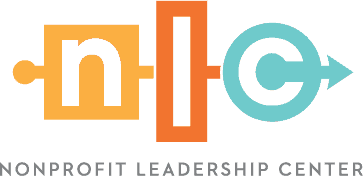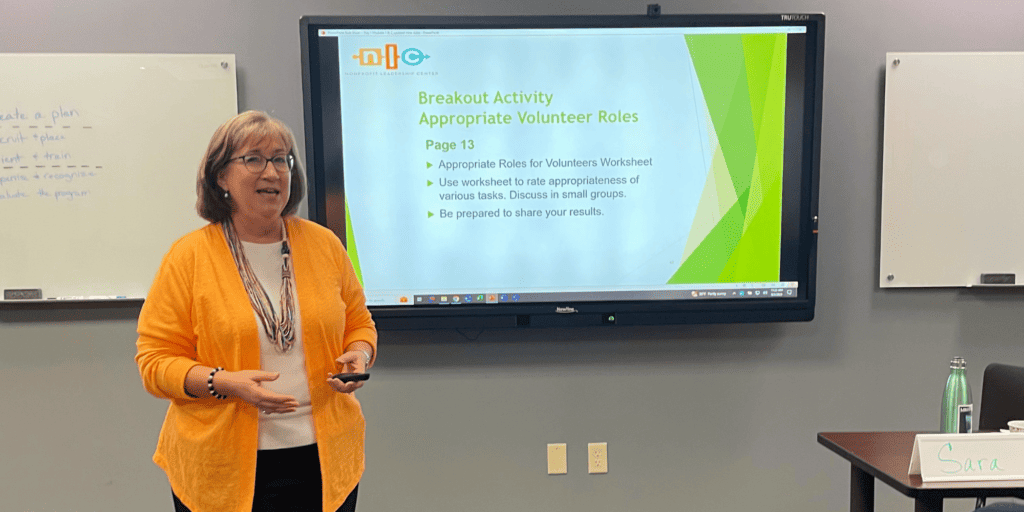For many nonprofits, volunteers act as a crucial heartbeat, providing invaluable skills, support and capacity to strengthen organizations and communities. But what happens if a volunteer acts inappropriately or in a way that could be harmful to your organization?
Nonprofit Leadership Center trainer Sara Leonard, MBA, CFRE, encourages every nonprofit with volunteers to have a structured volunteer evaluation process in place to continuously improve the organization and the experience volunteers have with it. But how do you evaluate a volunteer program and volunteer performance? Use Sara’s top three tips for effective volunteer evaluation to help your nonprofit thrive for others, through others.
How to Evaluate Your Nonprofit’s Volunteer Program
1. Convene an Evaluation Team
Volunteer program evaluation is not one person’s responsibility; everyone plays a role. A good volunteer manager should help your organization recognize this and build a team approach. Here are a few factors to consider when assembling your nonprofit’s volunteer program evaluation team:
- Determine what skills you need and how often the group should meet. This will help determine how many team members you need. An evaluation team should include board members, staff, external evaluation experts, clients, community members, and of course, your volunteers!
- Identify your team’s purpose. Determine why are you conducting an evaluation and what decisions need to be made upon completion of the evaluation. Ensure the evaluation connects with your nonprofit’s goals, objectives and strategies.
- Identify who or what you are evaluating and why. Who is your target audience for the final summary or report
Some priorities may include the quality of your volunteer infrastructure, volunteer satisfaction, number of volunteer hours /clients served, safety of clients and volunteers, etc.
Finally, ask yourself if you have the resources to support the planning and implementation costs of your volunteer evaluation.
READ NEXT: How to Calculate the Value of Volunteer Time
2. Design and Conduct Your Evaluation
When evaluating your volunteer programs, you can use a process, goal or outcome-based evaluation. Identify the method of evaluation you will use based on your reason for conducting the evaluation:
- Process-based evaluations focus on the program design and achieving efficiencies.
- Are volunteers receiving adequate training to deliver services to clients?
- How do volunteers learn about the program?
- What do volunteers see as strengths or weaknesses of the program?
- Goal-based evaluations focus on the degree to which the program met its predefined goals.
- Did the program achieve its goals?
- How were volunteer goals established and should this process be changed in the future?
- Were there adequate resources to meet the predefined goals?
- Outcomes-based evaluations measure a significant change that has occurred to an activity.
- Did the activities performed lead to the outcome(s) that your nonprofit believes your clients and/or community needs?
For each evaluation, you can use qualitative or quantitative approaches to gathering data, or both. Qualitative data is descriptive data, typically obtained from one-on-one interviews, focus groups or open-ended questions, that uses information that is harder to measure with numbers, such as the feelings your volunteers report about the program.
Quantitative data can be measured and recorded with numbers from tools such as online surveys (e.g., the percentage of volunteers who agree or disagree with various statements, etc.).
Once you’ve determined the type of information you need and have designed your evaluation plan, conduct the evaluation and collect your data.
3. Analyze and Interpret Data & Communicate Results
While gathering, analyzing and interpreting data will be based on the type of data you have collected, always communicate results to key stakeholders. You may use reports, summaries, graphs, charts, pictures and presentations. When communicating your results, remember these tips:
- Always provide context for the report by explaining the processes and people who were involved in the evaluation.
- Always include the actions and next steps necessary to respond to the findings and improve results in the future.
READ NEXT: 5 Creative Ways to Recognize Volunteers
"Volunteer program evaluation is an ongoing process."
Sara Leonard Tweet
Get Your Certificate in Volunteer Management
The Certificate in Volunteer Management prepares today’s volunteer managers to more effectively recruit, retain and recognize volunteers. Developed to address the challenges all volunteer managers encounter, the curriculum is designed by Hands On Network, the volunteer-focused arm of Points of Light Institute.
During three sessions, Sara Leonard, MBA, CFRE, will lead you through interactive exercises to gain knowledge and skills to use immediately when you get back to your organization.
- Understanding Volunteering
- Planning Your Volunteer Program
- Recruiting and Placing Volunteers
- Orienting and Training Volunteers
- Supervising Volunteers
- Evaluating Your Volunteer Program


